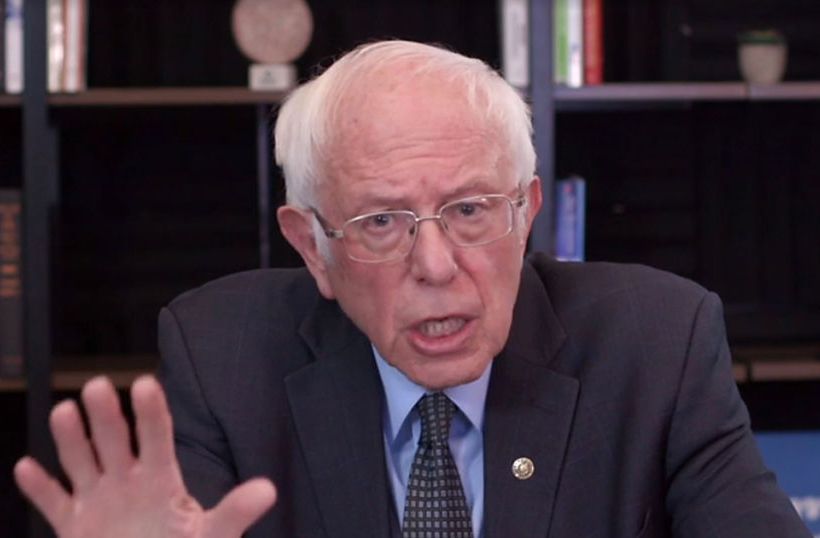Mathematically speaking, Bernie Sanders’s presidential campaign is as dead as disco. After a streak of victories in big, delegate-rich states on and after Super Tuesday, Joe Biden is leading Sanders by 273 delegates. For Sanders to pull off a political miracle, he would need to win 64.2 per cent of the remaining delegates over the next three months, something nobody but the most rabid Bernie supporter envisions the Vermont senator doing.
Some of the largest states left to vote – Georgia, Ohio, Maryland, New Jersey, Pennsylvania, and New York – aren’t seen as particularly ripe fruit for the Sanders campaign to pluck. The best the senator can do is win a few delegates in these states, increase his overall count, and use that tally during the Democratic convention in the summer as leverage when the party negotiates its platform.
There has always been a deep frustration in the inner-sanctum of the Democratic party about who Bernie Sanders is, how he acts, and what he represents. Like Donald Trump, the Democratic party appreciates loyalty from its members. If you lose a race, you’re expected to bow out gracefully, give a humble but inspiring concussion speech about how Democrats are stronger together, and quickly endorse the frontrunner. Sanders, however, isn’t officially a member of the Democratic party and has taken great pains to remind people during his three decades in Washington, D.C. that he isn’t beholden to what the party establishment wants.
In 2016, Sanders infuriated Hillary Clinton when he continued campaigning for the nomination months after his actual chances of winning were vanquished. Bernie spent the time poking Clinton for giving high-priced speeches to financial titans like Goldman Sachs and knocked her on the debate stage and in speeches for refusing to release the transcripts of those speeches to the public. The insinuation was that Clinton, the presumptive Democratic presidential nominee at that time, had her priorities all wrong and couldn’t be trusted. It was a critique Donald Trump picked up and used to great effect during the general election. Many Democrats believe to this day that Bernie Sanders was the X-factor, the reason Trump shocked the political world with a historical upset. Loyalists of the Clinton camp are sure of it.
Some of those very same Democrats are getting nauseous at the thought of Bernie doing to Joe Biden what he did to Hillary Clinton: hang on for months despite the insurmountable maths; attack him on the debate stage for being an agent of the status-quo; rail against the Democratic party’s alleged rigging of the primary contest; and amplify the anger of his supporters to such an extent that they decide to say home in November. Philippe Reines, a long-time adviser to Hillary Clinton, bluntly equated Bernie to a narcissist who cares about nothing but himself. ‘Everyone should stop pretending that Bernie is doing anything other than helping Bernie,’ Reines told the Washington Post. A good chunk of the party violently nodded in agreement at those words.
Bernie’s decision to stay in the race, however, isn’t so surprising. What is surprising is that so many Democrats – particularly of the moderate persuasion – appeared to genuinely believe the senator would exit stage-left.
Let’s remember who Bernie Sanders is. This is a man who has never missed an opportunity to lecture the United States of America and the political establishment in Washington, D.C. about the economic inequality, poverty, powerful special interests and corporate greed infesting the land and defining America’s political system and its society. He has spent over 40 years talking about these same issues. It doesn’t matter which job he was holding at the time or whether he was speaking in the mayor’s office in Burlington, on the floor of the U.S. Senate, or on the presidential campaign trail. What mattered was highlighting the systemic grievances of the masses and gaining public support for his policies: Medicare-for-all; free public college tuition; holding the financial industry accountable; and bringing political power back to the working class.
You may love Bernie or hate him, but you know what you’re going to get with the guy. Lawmakers on both sides of the aisle expect the words ‘millionaires and billionaires’ to come out of his mouth whenever he delivers remarks in the chamber. And sure enough, Bernie never disappoints.
Bernie Sanders has been a national political figure for five years now, but the political commentariat in general is still ignorant about what motivates him. They remain dumbfounded that a politician who has essentially been defeated would choose to keep stumping instead of cutting short the humiliation. No normal politician would do this, they say. Well, newsflash: Bernie isn’t a normal politician.
To the democratic socialist from Vermont, the ideological fight has always been more important than the electoral one. And for whatever reason, Democratic party operatives, politicians, and a large section of the media still can’t comprehend it.
Got something to add? Join the discussion and comment below.
Get 10 issues for just $10
Subscribe to The Spectator Australia today for the next 10 magazine issues, plus full online access, for just $10.




















Comments
Don't miss out
Join the conversation with other Spectator Australia readers. Subscribe to leave a comment.
SUBSCRIBEAlready a subscriber? Log in